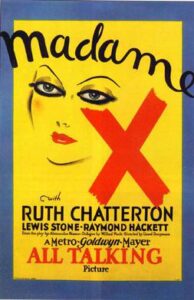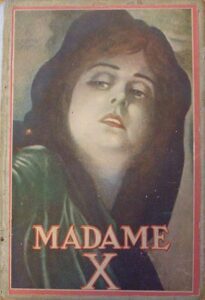Madame X [Absinthe] ** (1929, Ruth Chatterton, Lewis Stone, Raymond Hacket) – Classic Movie Review 13,146
MGM’s 1929 drama film Madame X stars Ruth Chatterton in the third film version of the Alexandre Bisson play about Jacqueline Floriot, a fallen woman on trial for murder, defended unwittingly by her son.
Director Lionel Barrymore’s 1929 MGM all-talking American pre-Code drama film Madame X [Absinthe] stars Ruth Chatterton in the third film version of the old theatrical chestnut based on the ancient Alexandre Bisson play about Jacqueline Floriot, a fallen but now wealthy woman on trial for murder, who is defended by an attorney who does not know that he is her son.
Ruth Chatterton plays Jacqueline Floriot, who is accused of murder, and is defended by her long-lost son who doesn’t recognise her, in this terribly old-fashioned, rigid and decrepit third (first sound) version of the old weepie (based on the Alexandre Bisson play) made by Lionel Barrymore during his brief spell as director at MGM.
Mother was having an affair, and was chucked out into the streets by jealous wicked father Louis (Lewis Stone) 20 years ago when the kid was four, and the boy grows up thinking she is dead. Calling herself Madame X, Jacqueline Floriot admits to killing the scoundrel Laroque (Ullrich Haupt). Now, by chance, the lawyer assigned to her defence case is Raymond Floriot (Raymond Hackett), who can’t understand why she refuses to defend herself in court. Well, she won’t tell him, will she?
Though it’s all-talking, it plays like a silent movie they’ve dubbed sound onto, with exaggerated theatrical, over-dramatic performances, but nevertheless Ruth Chatterton brings some rather impressive allure to the star role, and the story itself maintains its weird interest.
Remaking 1916 and silent 1920 versions, it was re-titled for TV as Absinthe to avoid confusion with the 1937 version, which possibly doesn’t make the heart grow any fonder about it.
The film was considered for 1930 Academy Awards for Best Director (Barrymore) and Best Actress (Chatterton), in effect unofficial nominations because nominating finalists for the awards was not yet adopted.
MGM, keen to show off the film as a serious drama, held the premiere in the Sam H Harris Theater, New York City, a specially hired legitimate stage venue.
Goldwyn Pictures filmed the play in 1920, and when Goldwyn merged with Metro Pictures and Louis B Mayer Pictures to become MGM in 1924, the studio inherited the screen rights to the play.
There is no music in the opening or closing credits, as studios expected cinema musicians to provide live accompaniment for the credits. Keyboardists and orchestras were still providing music for silent films in cinemas in the late 1920s, and live music for a sound film was seen as a way to make the screening more of a special event.
The cast are Ruth Chatterton as Jacqueline Floriot, Lewis Stone as Louis Floriot, Raymond Hackett as Raymond Floriot, Holmes Herbert as Noel, Eugenie Besserer as Floriots’ servant Rose, Mitchell Lewis as Colonel Hanby, Ullrich Haupt as Laroque, Sidney Toler as Dr Merivel, Richard Carle as Perissard, Claude King as prosecutor Valmorin, Carroll Nye, John P Edington, and Chappell Dossett.
Madame X [Absinth] is directed by Lionel Barrymore, runs 95 minutes, is made and released by MGM, is written by Willard Mack, based on the 1910 Alexandre Bisson play, is shot in black and white by Arthur Reed, is scored by William Axt, and is designed by Cedric Gibbons.
Release date: August 17, 1929.
Madame X was performed in 1910 both in Paris and on Broadway with Sarah Bernhardt in the lead role.
MGM was founded on April 17, 1924 and has been owned since 2022 by Amazon MGM Studios, a subsidiary of Amazon.
Madame X movies
Madame X (1916 lost American silent film) starring Dorothy Donnelly, Madame X (1920), starring Pauline Frederick, Madame X (1929), starring Ruth Chatterton, Madame X (1937), starring Gladys George, The Trial of Madame X (1948) starring Mara Russell-Tavernan, Madame X (1952), starring Gloria Romero, Madame X (1954 Greek film), Madame X (1955 Mexican film), Madame X (1966 film), starring Lana Turner, and Madame X (1981 TV film), starring Tuesday Weld.
© Derek Winnert 2024 – Classic Movie Review 13,146
Check out more reviews on http://derekwinnert.com





